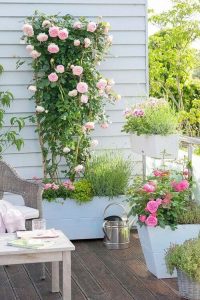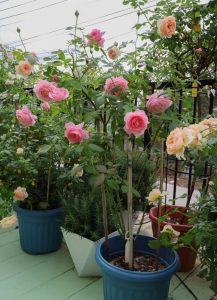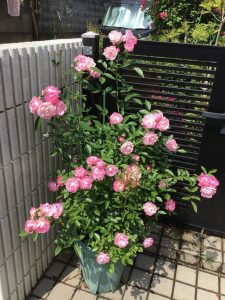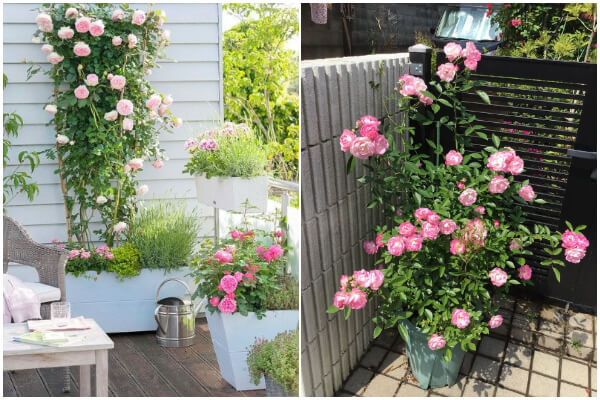Growing roses on your balcony not only adds beauty and elegance but also offers the satisfaction of cultivating vibrant flowers in a small space. With the right care and attention, you can enjoy healthy, blooming roses even in urban environments. In this detailed guide, we’ll cover everything from choosing the best roses for balcony gardens to essential care tips that will ensure your roses thrive in containers.
1. Selecting the Best Roses for Balcony Gardens
When it comes to growing roses on your balcony, choosing the right variety is crucial. Not all roses are suited to container life, so it’s important to pick those that perform well in pots or small spaces. Here are some of the best options for balcony rose gardening:

- Miniature Roses: Perfect for small spaces, these compact roses are ideal for container gardening. They produce beautiful blooms and are available in various colors, making them a favorite for balcony gardens.
- Patio Roses: These are slightly larger than miniature roses but still well-suited to containers. Patio roses often bloom prolifically and are low-maintenance, making them perfect for beginners.
- Climbing Roses: If you have a balcony with vertical space, consider planting climbing roses. With proper support, these roses can grow up trellises or balcony rails, adding height and drama to your garden.
- Groundcover Roses: For a fuller effect, groundcover roses are a great choice. They spread quickly and are perfect for covering larger containers or hanging baskets.
By selecting the right type of rose, you ensure that your plants grow strong and beautiful without taking up too much space.
2. Choosing the Right Container
The container you use plays a crucial role in the health of your balcony roses. Roses need ample space for their roots, and a well-chosen container helps promote healthy growth. Consider the following tips for selecting the right pots:

- Size: Choose a container that is at least 12 inches deep and wide. This will provide enough space for the roots to spread out and develop properly.
- Material: Opt for materials like terracotta, ceramic, or fiberglass. These materials help regulate moisture levels, preventing the roots from drying out or becoming waterlogged.
- Drainage: Ensure that your container has proper drainage holes. Roses don’t like sitting in water, and good drainage helps avoid root rot.
- Weight: Since your container will be on the balcony, choose a pot that is sturdy but not too heavy. Lightweight pots made from plastic or resin can be good options, especially if you plan to move them around.
3. Preparing the Soil
Roses grown in containers require well-draining, nutrient-rich soil. Regular garden soil may be too heavy for container roses, so it’s important to choose a high-quality potting mix specifically formulated for roses or flowering plants. You can also create your own mix by combining the following:

- Peat moss or coconut coir: These help retain moisture and improve soil structure.
- Perlite or vermiculite: These ingredients enhance drainage, preventing waterlogging.
- Compost or well-rotted manure: These provide essential nutrients for healthy growth and flowering.
If you’re repotting your roses or planting them for the first time, mix in slow-release fertilizer to ensure your roses receive a steady supply of nutrients throughout the growing season.
4. Sunlight Requirements
Roses are sun-loving plants that require a minimum of 6 hours of direct sunlight each day. If your balcony faces south or west, it will be perfect for growing roses. However, if your balcony gets less sun or is shaded by buildings or trees, there are a few ways to work around this:
- Choose Sun-Loving Varieties: Some rose varieties, like climbing roses and patio roses, are more tolerant of partial shade than others.
- Rotate Pots: If your roses are in containers, rotate the pots regularly to ensure they get an even amount of sunlight on all sides.
- Consider Reflective Surfaces: If you’re growing roses in a shaded area, you can enhance light exposure by using reflective surfaces like mirrors or aluminum foil to bounce sunlight onto the plants.
5. Watering
Proper watering is essential for healthy roses. In containers, roses tend to dry out faster, so it’s important to keep the soil consistently moist but not soggy. Follow these tips for watering your balcony roses:

- Water Deeply: Roses have deep roots, and it’s important to water deeply to encourage strong root growth. Ensure the water reaches the root zone.
- Avoid Wetting the Foliage: Wet leaves can promote fungal diseases, so water at the base of the plant instead of overhead.
- Watering Frequency: During hot summer months, container roses may need watering every day, especially if the weather is dry. In cooler months, you can reduce watering frequency.
6. Fertilizing for Healthy Blooms
Roses are heavy feeders, meaning they need regular fertilization to thrive. Use a balanced fertilizer that’s specifically designed for roses, and apply it according to the instructions on the packaging. Here are some tips for fertilizing your balcony roses:

- Start in Spring: Begin fertilizing your roses early in the spring, just as new growth begins to appear.
- Feed Throughout the Growing Season: Continue to fertilize throughout the growing season, especially if your roses are in containers, as nutrients are depleted faster in pots.
- Organic Options: If you prefer organic gardening, compost and organic rose fertilizers can also be used to enrich the soil and promote healthy growth.
7. Pruning and Deadheading for Continuous Blooms
Pruning and deadheading are key to maintaining the health and appearance of your roses. Regular pruning removes dead or damaged growth, while deadheading encourages new blooms. Here’s how to care for your roses:
- Prune in Early Spring: In early spring, trim back any dead or diseased wood to promote new growth. Also, cut back the stems by about one-third to encourage stronger growth.
- Deadhead Regularly: Removing spent flowers after they’ve bloomed encourages your roses to produce more buds, resulting in a longer blooming season.
- Shape Your Plants: Prune to maintain the desired shape of your roses, whether you prefer a bushy appearance or a more upright, climbing structure.
8. Protecting from Pests and Diseases
Roses are susceptible to a variety of pests and diseases, such as aphids, black spot, and powdery mildew. To protect your roses on the balcony:
- Inspect Regularly: Check your roses weekly for signs of pests or disease. Early detection is key to managing these issues.
- Natural Pest Control: Use natural pest control methods, like neem oil or insecticidal soap, to treat infestations without harming beneficial insects.
- Good Air Circulation: Ensure your roses are spaced properly in containers to allow good airflow, which helps prevent fungal diseases.
9. Winter Care
In colder climates, winter can pose a challenge for roses grown on balconies. Here are some tips for winterizing your balcony roses:

- Insulate the Containers: Wrap your containers with materials like burlap or foam to protect the roots from freezing temperatures.
- Move Pots to Sheltered Areas: If possible, move your pots closer to a wall or to a sheltered corner to reduce exposure to harsh winds.
- Bring Indoors: In regions with severe winters, you may need to bring your container roses indoors during the coldest months.
Growing roses on your balcony can be a rewarding experience with the right preparation and care. By selecting the best rose varieties, choosing appropriate containers, ensuring they receive enough sunlight, and maintaining proper watering and feeding schedules, you can enjoy stunning roses throughout the season. With a little attention to detail, your balcony can become a blooming oasis filled with the beauty and fragrance of roses.
By incorporating these expert tips and optimizing your care routine, your balcony roses will thrive year after year, transforming your outdoor space into a lush floral paradise.

